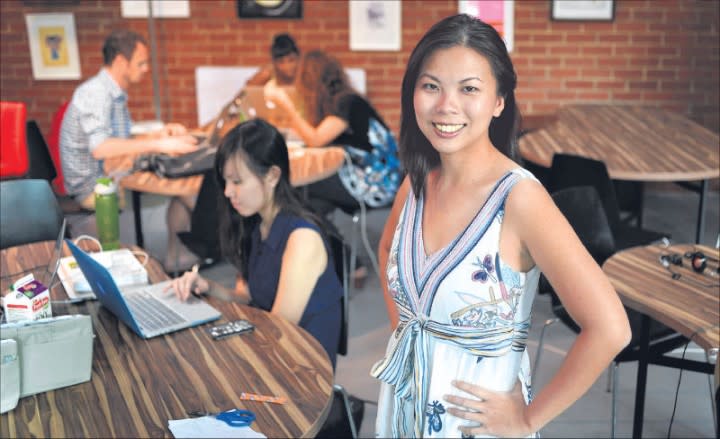Proof that coworking spaces are hot: The Hub Singapore just raised $1.1M

The Hub Singapore’s co-founder and CEO Grace Sai.
So-called coworking spaces are starting up everywhere in Southeast Asia. We spotted 38 of them at last count, and that’s an under-estimation.
While plenty are little more than glorified shared offices, a few do capture the essence of coworking – a shared space with a strong sense of community.
Some have even become hot property for investors: witness venture capital firms 500 Startups, Golden Gate Ventures, and Ardent Capital investing in Thai coworking space Hubba (amount undisclosed).
Add The Hub Singapore to this burgeoning trend. In an exclusive interview, co-founder and CEO Grace Sai tells Tech in Asia that the coworking space has raised S$1.5 million (US$1.1 million) in a “series A” round from a prominent angel investor, though he’d rather remain unidentified.
“He wants to unite the region. He wants to do something that brings Southeast Asia together. So he thinks we’re the pioneer of ecosystem building in this way in Singapore. And in the years to come we can unite the region through entrepreneurship,” says Sai.
When VCs venture beyond tech
It’s not outrageous for venture capitalists or angels to back businesses without a software-is-eating-the-world angle. It’s part diversification, part spotting a good business opportunity – whatever that may be. VCs have even backed “slow coffee” joints in San Francisco, and they were part of a US$335 million round in WeWork, a coworking space based in New York City and other parts of the US.
Coworking space as unicorn? It’s already happening.
It’s worth noting that the money from this investment is earmarked only for The Hub Singapore and not the other 65 spaces in the Impact Hub network. Each Hub runs as its own independent entity, though they convene regularly in general assemblies to vote on new protocols, which new cities to enter, and other matters.
For Sai, who launched Hub Singapore in 2012, the funding validates what she calls the Hub 1.0 strategy, which involves pioneering a startup-focused coworking space in the country and building up its legitimacy. It became profitable seven months after launch, and now has over 500 paying members. Sponsorship has become a major source of income. Memberships used to constitute 90 percent of revenue; they now make up 60 percent.
“Because we’re a very neutral platform, we attract a lot of partners who support our intentions […] we are [one of a few coworking spaces in Singapore] that was founded to build the entrepreneurship ecosystem,” says Sai.
Hub 2.0
Sai tells me Hub Singapore’s new mission statement is “to prototype the future of business, technology, and society in Singapore and the region.” That involves creating a microcosm of an ideal Singaporean society. When asked if that involves a shift away from social entrepreneurship, Sai says, “Yes and no.”
She adds that many tech startups are in the business of making social impact, and these are the kinds of endeavors she wants to support, regardless of whether the social enterprise label is affixed.
The new investment will go toward helping Hub Singapore give even better services to the ecosystem. Part of the money will be funnelled into a new coworking space (they’re moving to 128 Princep Street and it opens July 27) with better events and quality of startup services – in other words, a “one-stop startup factory.”
She plans to attract more mature startups by starting a host of professional services, from incorporation to marketing to legal and accounting. Beyond that, she wants to assists startups who’ve hit a growth ceiling by acting as a broker between them and large entities like corporations and governments.
Sai noticed the trend of large companies outsourcing their innovations because they can’t do it from within. At the same time, Singaporean technocrats are pushing the Smart Nation project, which aims to bring together governance and technology to improve the lives of Singaporeans. Hub Singapore has partnerships with government, corporations, and startups, making it a great meeting ground for collaboration.
“Everyone speaks a different language. Most people don’t know who exists on each side and who has intentions to collaborate. They have different cultures, pace, and rhythm, the bureaucracy or the lack of it. We speak both languages. We’ve scored more corporate partnerships than most intermediaries.”
This post Proof that coworking spaces are hot: The Hub Singapore just raised $1.1M appeared first on Tech in Asia.

 Yahoo Finance
Yahoo Finance 
